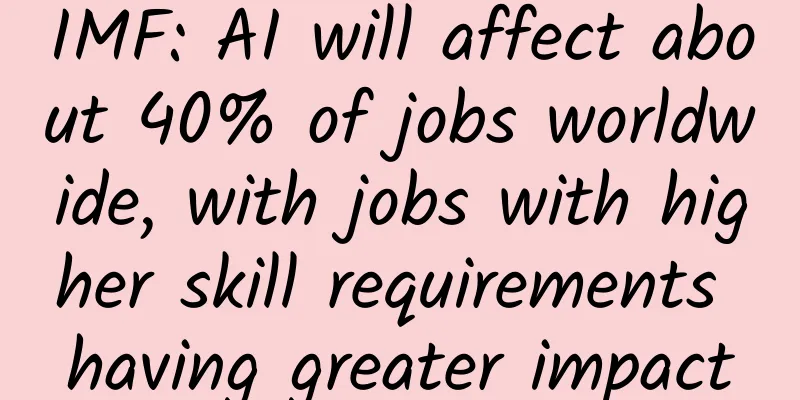IMF: AI will affect about 40% of jobs worldwide, with jobs with higher skill requirements having greater impact

|
Recently, according to domestic media reports, the Managing Director of the International Monetary Fund (IMF), Georgieva, said that according to the latest research of the IMF, artificial intelligence will affect about 40% of the world's jobs. The IMF report mentioned that nearly 40% of global jobs will be affected by artificial intelligence. Historically, automation and information technology tend to affect process tasks, but what makes artificial intelligence different is that it has the ability to affect high-skilled jobs. Thus, advanced economies face greater risks from AI than emerging market and developing economies, but also have greater opportunities to capitalize on the benefits of AI. Georgieva pointed out that the more skilled the jobs are, the more they will be affected by artificial intelligence. Compared with emerging markets and developing economies, developed economies face greater risks from artificial intelligence, but also have more opportunities to take advantage of its benefits. IMF analysis shows that in developed economies, about 60% of jobs could be affected by AI, compared with an estimated 40% and 26% in emerging markets and low-income countries, respectively. This means that emerging markets and developing economies face less direct disruption from AI, but at the same time, they also face difficulties in profiting from AI technology, as many countries have not yet developed adequate infrastructure or a skilled workforce. This means that over time, AI technology could exacerbate inequality between countries. “This could exacerbate the digital divide and income disparities across countries,” the IMF wrote in the report. Georgieva said that artificial intelligence may also affect the distribution of income and wealth within countries. In most cases, artificial intelligence may increase overall inequality, and policymakers must actively respond. Zikuai Technology |
<<: Scientists study new technology to activate human eyes: able to see infrared light
>>: AMD graphics card made by “girlfriend”?
Recommend
New energy vehicles make money by selling credits to make up for the vacancy caused by the reduction of subsidies?
At present, the financial subsidies for new energ...
Android also has its own "Shortcuts" app
Since iOS12, an additional app called "Short...
One-click information capture, is the high-dimensional light field detector so powerful?
Produced by: Science Popularization China Author:...
International Bird Day丨Come and learn about “birds”?
Since ancient times Beasts galloping in the fores...
What exactly are EFI and UEFI that replace traditional BIOS?
The traditional blue and white BIOS interface can...
Marketing strategy for e-commerce operations promotion!
A netizen has such a case: If you buy a box of mi...
From 0 to 1, interpreting Android ASO optimization!
Hello everyone, I am an ASO operations specialist...
Why is DOS still important?
Twenty years ago, Jim Hall, an undergraduate physi...
Guidelines for Advertising in the Tourism Industry
During the peak travel season at the end of the y...
The cute incarnations of ice and snow: How Bing Dwen Dwen and Shuey Rhon Rhon were born
Like the competition venues, mascots are also imp...
618 sprint! How to increase brand transactions on Xiaohongshu?
The 618 promotion has entered the sprint period, ...
Creative promotion of information flow, use these two tricks to get Buff immediately
Whether we are sales or marketing personnel, we h...
26% of users switch from iOS to Android during the season change, but experts believe Apple doesn't care
The lawsuit between Epic Games and Apple is still...
A different "cow" experience: Enjoy the TV version of "People's Niu Niu"
Screen: operate: Sound Effects: Plot: Experience:...









